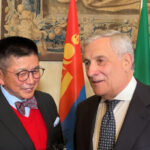We Mongolians have translated the phrase “inclusive economic growth” to mean accessible, wide, involved, and inclusive economic growth, and make use of it when discussing economic and social government policies. As it means the equal opportunity for representatives from all levels of society to participate in economic growth it is more appropriate to call it inclusive economic growth.
Equal opportunity first and foremost means equal opportunities for market entry, use of resources, and the same business environment. Inclusive growth means finding jobs to increase the incomes of poor and low-income citizens and as such is a relatively long term concept.
Stable economic growth requires inclusive growth. Inclusive economic growth is not an easy process because economic growth sometimes brings negative side effects such as corruption and significant differences in income. Mongolia currently is a clear example of this. Our amazing economic growth of 17% in 2011 was enough to astound the world but the livings standards of the citizens did not rise accordingly. The percentage of people living on less than $1.25 is 27%, having dropped only 2% since 2000. Even though the economy is almost fully dependent on the mining, price, and sales of mineral resources only 5% of the work force is employed in that sector. Roughly half the population of working age is unemployed and the gap between the rich and poor is steadily increasing. Ulaanbaatar is home the more than half the nation’s population and yet 60% of its residents do not have access to basic sanitation. And because the economy is “tripping” with stalled mining growth, increased inflation, and a devalued currency the ranks of the poor are looking to expand once again.
The gap between rich and poor is usually high for countries in the process of switching to democracy and a market economy but it is assumed that it will decrease with economic growth. Nobel Prize winning economist Kuznets said in 1955 that this gap provided the rich with the opportunity to amass enough wealth and expand their businesses and through this investment the economy would grow. President of the World Bank Jim Yong Kim recently announced that poor citizens must have an opportunity to share in the economic benefits. Only by sharing in these benefits will the living standards of all levels of society go up not just those of the poorest citizens (40% of the population) or certain wealthy citizens. Sharing in economic benefits means increasing the incomes of the poor, creating jobs, as well as providing access to education, food, water, and medical services.
The main issue is in how. The answer provided by the World Bank states that this is possible by increasing human capital, establishing a good social benefits structure, creating jobs, rewarding private enterprise, as well as creating and following stable financial and environmental policies.
The answer from the European Development Bank can be seen from the conclusions of the “Transition Report 2013”. It says that for countries switching to democracy and a market economy to reach the living standards of Western Europe the effectiveness of the reforms needs to be increased, in order to do this they need to enter into international integration, development domestic leadership, start a wider movement for fair and democratic society. The result of this study done in many different countries shows that the effectiveness of the transition is directly dependent upon the level of democracy, human capital development, and economic participation.
In any case, researchers in development organizations agree that in order to provide inclusive economic growth there are four factors that must occur simultaneously: accelerate political and economic reforms, strengthen the reforms of political and economic institutions, invest in human capital, and provide equal opportunities for economic participation in all levels of society.
Of these factors, in Mongolia the most challenging one, which is lagging behind the others, is the performance ability of state run organizations. The root of most development issues lies in the fact that the political parties that win elections though corruption and rise to political power are not able to manage other affairs quite so well. Mongolia is in dire need of a wide, public movement to fight corruption, and hold accountable those parties responsible for the abuse of public funds for their own benefits.
For inclusive growth Mongolia needs to support private enterprise, and put a stop to the multiple government subsidies and price ceilings, and implement a fair, simple and predictable economic and legal environment. Inclusive growth will be present in Mongolia when everybody has an equal rights and opportunities to receive education, run a business in line with personal aspirations, as well as work hard and amass wealth.
Only at that time will President Ts. Elbegdorj’s words to stop the “government skimming all the cream and citizens to fighting over the remains” from his “To an Intelligent State” talk come true. It is right that every citizen should participate in economic growth.
2014.10.15












